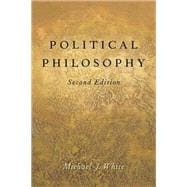
Note: Supplemental materials are not guaranteed with Rental or Used book purchases.
Purchase Benefits
What is included with this book?
| Acknowledgments and Preface to the Second Edition | p. ix |
| Introduction | p. 3 |
| Politics and Human Nature | p. 3 |
| The Idea of Human Nature or the Human | p. 9 |
| Good as "Function": Normative Anthropology | p. 5 |
| My "Story" of Political Philosophy-and My Cast of Characters | p. 9 |
| Enduring Issues in Political Philosophy | p. 13 |
| Classical Greek Political Philosophy: Beginnings | p. 21 |
| Protagoras's Democratic Traditionalism | p. 23 |
| The Functionalistic Foundation of the Political Aretai in Nature (Physis) | p. 27 |
| Glaucon's Contractarian Political Theory | p. 31 |
| Plato: Government for Corrupted Intellects | p. 37 |
| Socrates' Polis of Pigs | p. 37 |
| The "Republic" of Plato's Republic | p. 40 |
| The Human Ergon and the Purpose of Political Organization | p. 43 |
| Furthering Rationality by Means of the Polis? | p. 46 |
| Why Should Anyone Return to the Cave? | p. 52 |
| Plato and "the Rule of Law" | p. 55 |
| Aristotle: Politics as the Master Art | p. 65 |
| The Human Good: Intellectual and Political | p. 65 |
| "Acting Correctly" (Eupraxia) as a Grand End? | p. 72 |
| The Polis as a Complete Community | p. 79 |
| The Role of Politics: the Master Art? | p. 86 |
| Concluding Thoughts | p. 92 |
| Cicero: The Cosmic Significance of Politics | p. 98 |
| Cicero as Champion of the Res Publica | p. 100 |
| What is Right (Ius): The Rule of Law (Lex) and Normative Anthropology | p. 104 |
| Virtues, Duties, and Laws | p. 107 |
| Christianity: A Political Religion? | p. 118 |
| The New Testament and Beyond | p. 119 |
| Pauline Cosmopolitanism | p. 127 |
| The Roman Empire Christianized | p. 137 |
| The Advent of Tempora Christiana (The Christian Era) | p. 141 |
| Augustine, Aquinas, and Marsilius of Padua: Politics for Saints, Sinners, and Heretics | p. 148 |
| St. Augustine | p. 151 |
| The Two Rationales of Augustine's City of God | p. 151 |
| The Two Cities | p. 152 |
| Theoretical Political Consequences | p. 158 |
| Christians as Good Citizens of Secular States? | p. 164 |
| St. Thomas Aquinas | p. 169 |
| The Human Function: Nature and Praeternature | p. 171 |
| The "Parts" of the Eternal Law: Divine, Natural, and Human Law | p. 183 |
| Political Forms, Procedures, and other Particulars | p. 192 |
| Aquinas's Political Philosophy: Some Concluding Observations | p. 200 |
| Marsilius of Padua | p. 203 |
| The Autonomous but Coercive Regnum (Political Community) and Its Law | p. 205 |
| The Political Wisdom and Authority of the Whole Body of Citizens | p. 213 |
| Hobbes and Locke: Seventeenth-Century Contractarianism | p. 226 |
| Thomas Hobbes: Natural Law Simplified and Modernized | p. 232 |
| Natural Law, Natural Rights, and the Human Function | p. 233 |
| Law, Contracts, and the "Leviathan" | p. 248 |
| The Civil State: Sovereign and Subjects | p. 254 |
| Concluding Thoughts on God and Sovereigns | p. 260 |
| John Locke: Divinely Mandated Autonomy, Natural Rights, and Property | p. 262 |
| Moral Knowledge and Human Motivation | p. 264 |
| The State of Nature and the Social Contract | p. 270 |
| Property and Liberal Political Theory: Lockean Origins | p. 277 |
| Rousseau and Marx: Reaction to Bourgeois-Liberalism | p. 290 |
| Jean-Jacques Rousseau: Autonomous Citizens for the True Republic | p. 292 |
| The Intertwined Development of Civilization, Corruption, and Morality | p. 295 |
| The Social Contract and the Émile: Republics and Republican Citizens | p. 304 |
| Politics and the Human Function | p. 317 |
| Karl Marx: Distortion of the Human Function Within the Bourgeois-Liberal State | p. 319 |
| Political Emancipation and the Bourgeois-Liberal State | p. 324 |
| Alienation and the Human Function | p. 332 |
| Historical Materialism and the Coming of Communism | p. 337 |
| Concluding Thoughts: the Cookshops of the Future made Present | p. 339 |
| Mill and Rawls: Liberalism Ascendant? | p. 348 |
| John Stuart Mill: Perfectionist Liberalism | p. 351 |
| Mill's Liberalism | p. 352 |
| Liberty and Government | p. 361 |
| Democratic Republicanism | p. 365 |
| Concluding Thought on Mill and Liberalism | p. 372 |
| John Rawls: Political (and Nonperfectionist?) Liberalism | p. 372 |
| Egalitarian Justice as the "First Virtue of Social Institutions": Basic Assumptions | p. 373 |
| Rawls's Two Principles of Justice: What They Apply to and Why | p. 383 |
| Consensus, Public Reason, and the Distinction between Citoyen and Bourgeois | p. 392 |
| The Ultimate Justification of Rawlsian Liberalism? | p. 397 |
| Epilogue | p. 409 |
| Index | p. 417 |
| Table of Contents provided by Ingram. All Rights Reserved. |
The New copy of this book will include any supplemental materials advertised. Please check the title of the book to determine if it should include any access cards, study guides, lab manuals, CDs, etc.
The Used, Rental and eBook copies of this book are not guaranteed to include any supplemental materials. Typically, only the book itself is included. This is true even if the title states it includes any access cards, study guides, lab manuals, CDs, etc.